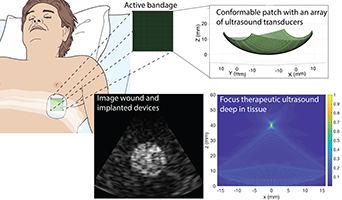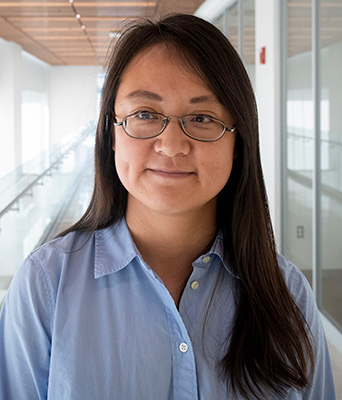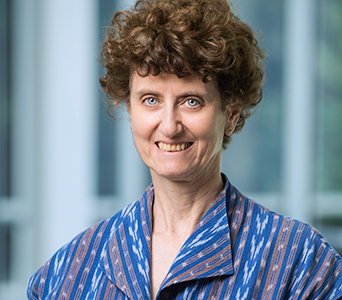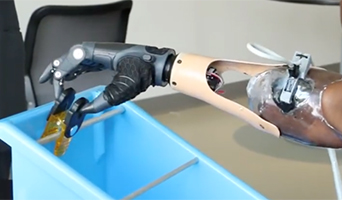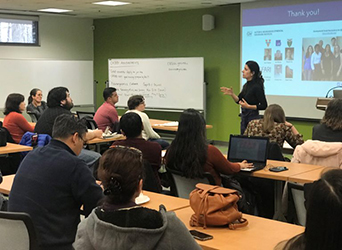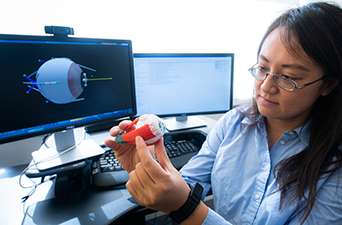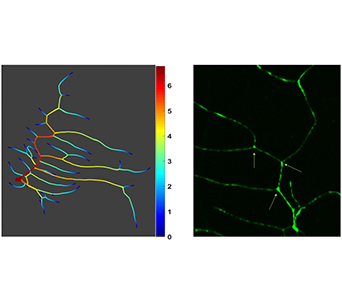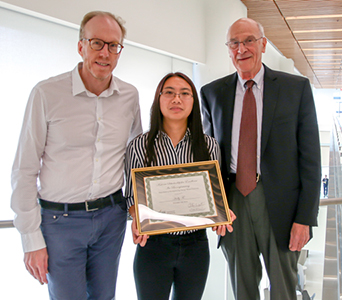Bioengineering faculty members, recognized as the best in their fields, conduct valuable research. Their funding sources include a variety of federal agencies, as well as grants from business and industry.
Giorgio Ascoli receives funding for study of the brain and learning
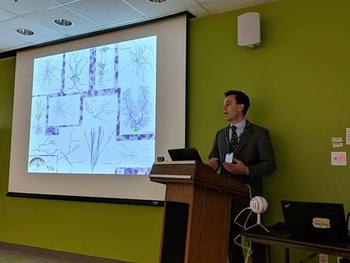
A study led by bioengineering professor Giorgio Ascoli has received $250,000 in funding from the U.S. Department of Energy. The project will use a massive open-source repository called Hippocampome maintained by Ascoli’s lab. Incidentally, Ascoli’s lab recently received attention via a gmu-tv video highlighting another of its open-source repositories, NeuroMorpho.org. Ascoli says, “The future of neurological research is collaborative, and NeuroMorpho.org is where collaboration happens.” Read more about the grant for his study of the brain and learning.
Giorgio Ascoli inducted to prestigious medical and bioengineering institute
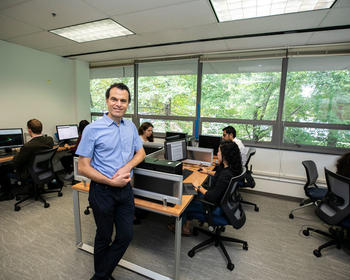
Giorgio Ascoli was inducted into the American Institute for Medical and Biological Engineering (AIMBE) College of Fellows in February of 2022. His election to this prestigious group of biomedical and engineering leaders indicates that he has achieved a high-level of success in his profession. He was elected for contributions in the development of open-access resources in data science and investigation of learning, memory, and neurodegeneration. HIs induction ceremony will take place on March 25.
NIH grant leads to new understanding of aneurysms
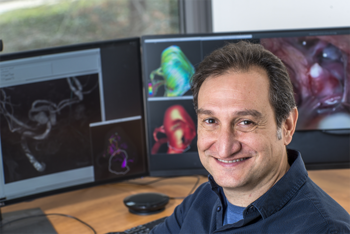
A team led by Juan R. Cebral and Anne M. Robertson (University of Pittsburgh) was awarded a $3.1 million grant from the National Institute of Neurological Disorders and Stroke of the National Institutes of Health. “Improving Cerebal Aneurysm Risk Assessment through Understanding Wall Vulnerability and Failure Modes” focuses on understanding the formation of blebs or secondary outpouchings in the aneurysm wall, their potential link to bacterial infiltration through dental infections, and how these sub-structures affect the vulnerability of the aneurysm and its propensity to rupture.
Cebral also received another $2.9 million grant entitled “Bridging the Gap from Hemodynamic Stress to Intracranial Aneurysm Instability.” This project uses a novel technology developed at UCLA to study the responses of endothelial cells to adverse hemodynamic flow conditions in cerebral aneurysms using in-vitro patient-specific vascular models in combination with in-silico models and clinical and tissue data.
Bioengineers and biologists battle cancer cells
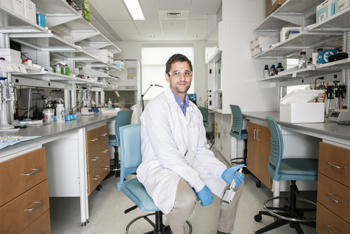
A team composed of Remi Veneziano, assistant professor of bioengineering, and colleagues in the School of Systems Biology, was awarded a $528,000 grant from the National Institutes of Health’s - Innovative Molecular Analysis Technologies Program (IMAT) for the project entitled “New Hybrid Molecular Modalities Comprised of DNA-Origami and Interfering Peptides as Inhibitors of Protein-Protein Interactions.” This project is leveraging the potential of DNA origami to engineer a novel delivery platform to target proteins that are currently considered ‘undruggable’ in order to improve cancer treatments.
Neural circuit technology makes the news

A publication authored by Professor Giorgio Ascoli appeared on the cover of Nature in the first issue of October 2021. Ascoli’s research involves developing technologies and models to investigate neural circuits from molecular to whole-brain scales. These technologies have implications for a better understanding of brain functions and brain diseases.
$498K NSF grant supports small-animal neuroimaging

Parag Chitnis, Remi Veneziano, and John R. Cressman received a $498K grant from NSF‘s Biophotonics program entitled “New class of DNA-templated near-infrared voltage-reporter for deep-brain imaging.” The project will develop novel DNA-based nanoparticles integrated with dyes that change their color spectrum in the near-infrared range in response to changes in the voltage of neuronal cell membranes.
Department of Defense awards $499K grant for wearable ultrasound sensors
Parag Chitnis, Qi Wei, Siddhartha SIkdar, and Pilgyu Kang received a $499K grant from DoD-CDMRP-RESTORE program entitled “Training and recovery augmented with ultrasound myography and assessment (TRAUMA) uising a flexible ultrasound-imaging patch.” The project will develop novel flexible ultrasound transducers that are powered using miniaturized electronics for dynamic imaging of muscle function during physical activity and rehabilitation exercises.
Mason Bioengineering team creates startup AexeRNA Therapeutics
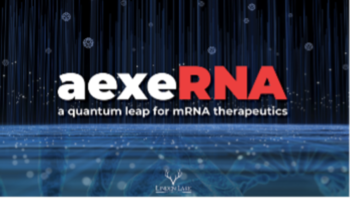
New computational and experimental ionizable lipid design methods and an improved self-assembly process for manufacturing have created a next-generation platform to deliver mRNA therapeutics. This platform was licensed to AexeRNA Therapeutics Inc. in collaboration with Linden Lake Venture Capital. AexeRNA has completed pre-seed financing, is moving into a local incubator space, and forming research partnerships with pharmaceutical partners.
Manufacturing and Characterization of Potent mRNA Lipid Nanoparticle Vaccines at Multiple Scales.
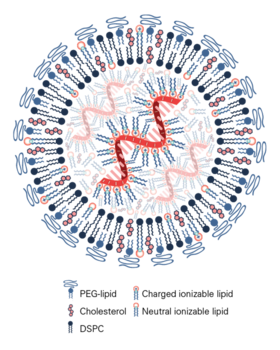
A team led by Professor and Chair of Bioengineering, Michael Buschmann, was awarded a $1.5 million grant from FDA’s Center for Biologics Evaluation and Research (CBER) entitled “Manufacturing and Characterization of Potent mRNA Lipid Nanoparticle Vaccines at Multiple Scales” in CBER’s Advanced Technologies Extramural Research Funding Program. The team includes Mikell Paige of the Department of Chemistry and Biochemistry and Dr Pat Gillevet in the Department of Biology at George Mason University and Professor Drew Weissman and Dr. Mohamad Alameh at the University of Pennsylvania. The project is based on recent discoveries by the group in the design and manufacturing of lipid nanoparticles that are the key delivery system in the current vaccines for COVID-19. Their technology increases the delivery efficiency of mRNA and in the project they plan to develop and test these methods at several manufacturing scales.
Mike Buschmann and Shani Ross receive a NIH R25 grant “ Clinical Immersion with Health Professionals and Industry Advising in Undergraduate Biomedical Engineering Capstone Design”
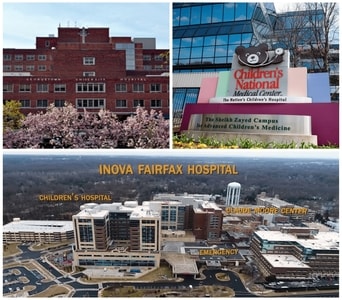
Professor and Chair Michael Buschmann and Assistant Professor and Associate Chair Shani Ross were recently awarded a $198k R25 Team-Based Design in Biomedical Engineering Education grant from the National Institutes of Health to develop a new senior year capstone design course and summer clinical immersion program for Bioengineering students at George Mason University. Students will engage in a clinical immersion program over the summer at participating clinical sites to identify clinical-relevant needs. Later, in senior design, they will work alongside students from nursing and health administration to develop solutions for these unmet needs following a medical product development process. The design teams will be supported by multidisciplinary advising teams comprising faculty from Bioengineering, Nursing, Health Informatics and Health Policy; as well as from industry partners on the department’s advisory board. This multidisciplinary collaboration brings together faculty and students from bioengineering and CHHS, clinical partners from Inova Fairfax Medical Campus, Children’s National Medical Center, and Georgetown University Medical Center; and industry partners from the Mason Bioengineering Alliance. Check out the following news article.
The Center for Neural Informatics, Structure, and Plasticity (CN3) integrates single-cell identity with circuit function in vivo for the brain region responsible for spatial navigation and declarative memory
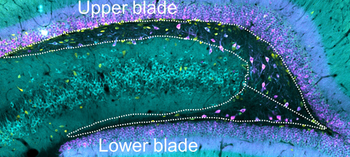
A new upgrade to Hippocampome.org, an open source tool developed by Dr. Ascoli and team in George Mason University - Volgenau School of Engineering has been integrated with data generated from researchers at the Institute Cajal of Spanish Research Council. This advancement, recently published in PLoS Biology [doi], "will allow the annotation and classification of high-density brain recordings, critical for brain machine interfaces". Learn more at the Medicalxpress or Eurekalert websites.
Giorgio Ascoli awarded $1.3M RF1 NIH grant from the National Institute of Mental Health entitled “Long-range neuronal projections: circuit blueprint or stochastic targeting?"
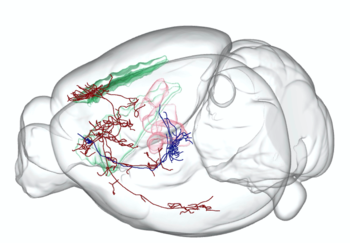
Individual nerve cells extending their arbors throughout the brain underlie functional connectivity and cognitive operations. Despite recent technological breakthroughs allowing the continuous accumulation of substantial amounts of whole-brain, single-neuron reconstructions, we still do not know whether these anatomical patterns constitute highly specific circuit motifs or simply reflect random variation within the known constraints of regional connections. This project will rigorously and systematically identify the first comprehensive axon projection “parts list” of a mammalian brain, quantifying for each neuronal class the population size, computational properties, and possible role in neural network function and dysfunction.
Giorgio Ascoli receives 5-year NIH R01 grant “Generation and Description of Neuronal Morphology and Connectivity”
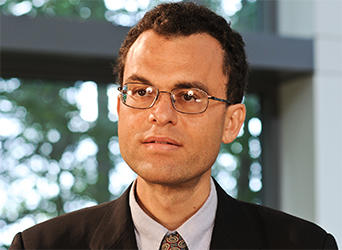
University Professor and Center for Neural Informatics Director Giorgio Ascoli was awarded $1.8M in science funding from the National Institute of Neural Disorders and Stroke. This multidisciplinary project will substantially expand ongoing efforts to shed light on the role of specific neuron types and their interactions in impairments of memory formation and retrieval. This research is nicely aligned with the first goal of the BRAIN Initiative, which is also providing generous support to Ascoli’s lab.
Parag Chitnis receives a DARPA grant “TRAUMAS: Treatment and Recovery Augmented with Electrical and Ultrasound-Mediated Actuation and Sensing”
Parag Chitnis was recently awarded a $1.2M grant as a member of a consortium of nine academic and industry entities led by Columbia University with a total budget of $16.4M. The goal of this multidisciplinary project funded by Defense Advanced Research Projects Agency (DARPA) is to integrate ultrasound and electrical means for biosensing and modulation in bandages for improving healing outcomes of recalcitrant wounds.
Qi Wei receives 2020 Teaching Excellence Award
Associate Professor Qi Wei was selected as one of the university-wide Teaching Excellence Award winners for her team teaching and collaborative learning work with students.
Outstanding teaching is an integral part of Mason’s mission and is deserving of significant recognition. The Teaching Excellence Awards are both institutional recognition and a monetary acknowledgment of the significant work that faculty members devote to course planning and preparation; curriculum development; and innovative teaching, advising, and undergraduate and graduate mentoring.
Kim T. Blackwell inducted into Medical and Biological Engineering Elite
Kim “Avrama” Blackwell has been inducted into the AIMBE College of Fellows. Her election to this prestigious group of biomedical engineering leaders indicates that she has achieved a high-level of success in the profession. Her election was based on outstanding contributions in the development of novel computational algorithms and models of neural plasticity underpinning learning and substance abuse.
Siddhartha Sikdar receives an NIH grant “Sonomyographic Upper Limb Prosthetics: A New Paradigm”
CASBBI Director Siddhartha Sikdar and colleagues were recently awarded a $3.6M Bioengineering Research Partnership grant from the National Institute of Biomedical Imaging and Bioengineering to develop and clinically evaluate a new prosthetic control system that uses ultrasound imaging. This multidisciplinary collaboration brings together members of CASBBI’s Biomedical Imaging Laboratory (PI: Sikdar, Key Personnel: Chitnis), commercial partners at Infinite Biomedical Technologies, and clinicians at MedStar National Rehabilitation Hospital and Hanger Clinic to accelerate technology translation to commercial products.
Siddhartha Sikdar receives an NSF “NRT-HDR: Transdisciplinary Graduate Training Program in Data-Driven Adaptive Systems of Brain-Body Interactions”
This National Science Foundation Research Traineeship (NRT) award will address the need to train a versatile, interdisciplinary community-engaged STEM workforce with the skills to harness the data revolution to create fundamental research and translational innovations aimed at improving the quality of life for individuals with disabilities. Principal investigators: Siddhartha Sikdar, Padmanabhan Seshaiyer, Nathalia Peixoto, James Thompson, and Huzefa Rangwala.
Qi Wei receives an NIH grant "Data-Driven Biomechanical Simulation of Eye Movement and Strabismus"
Supported by an NIH R01 award, Associate Professor Qi Wei develops and applies clinical data-driven computational simulation to study the neuro-biomechanics of strabismus, or crossed eyes. Together with Dr. Joseph Demer at UCLA, professor Matthew Tresch at Northwestern University and professor Wilsaan Joiner at UC-Davis, Wei aims to advance our understanding of two particular types of strabismus and provide quantitative assessment of surgical treatment effectiveness on these conditions.
Giorgio Ascoli has renewed a National Institutes of Health R01 “Cytoskeletal mechanisms of dendrite arbor shape development”
The NIH Research Project (R01) grant supports health-related research and development based on the mission of the institutes. Professor Ascoli, together with professor Daniel Cox from Georgia State University, recently discovered that the local microtubule quantity fully predicts arbor length and that bifurcations are strongly associated with enrichment in local F-actin. The picture is the representation of the two points in a fly neuron (left: heat map of microtubule concentration; right: microscopy image of F-actin).
Holly To receives the 2019 Katona Scholarship for Excellence in Bioengineering
Students selected for the scholarship have demonstrated strong academic performance, professional leadership within the university or outside, and exceptional promise for a successful bioengineering career that would benefit society. To's outstanding academic performance and her continued commitment to the department, its students, and George Mason University earned her this award.

